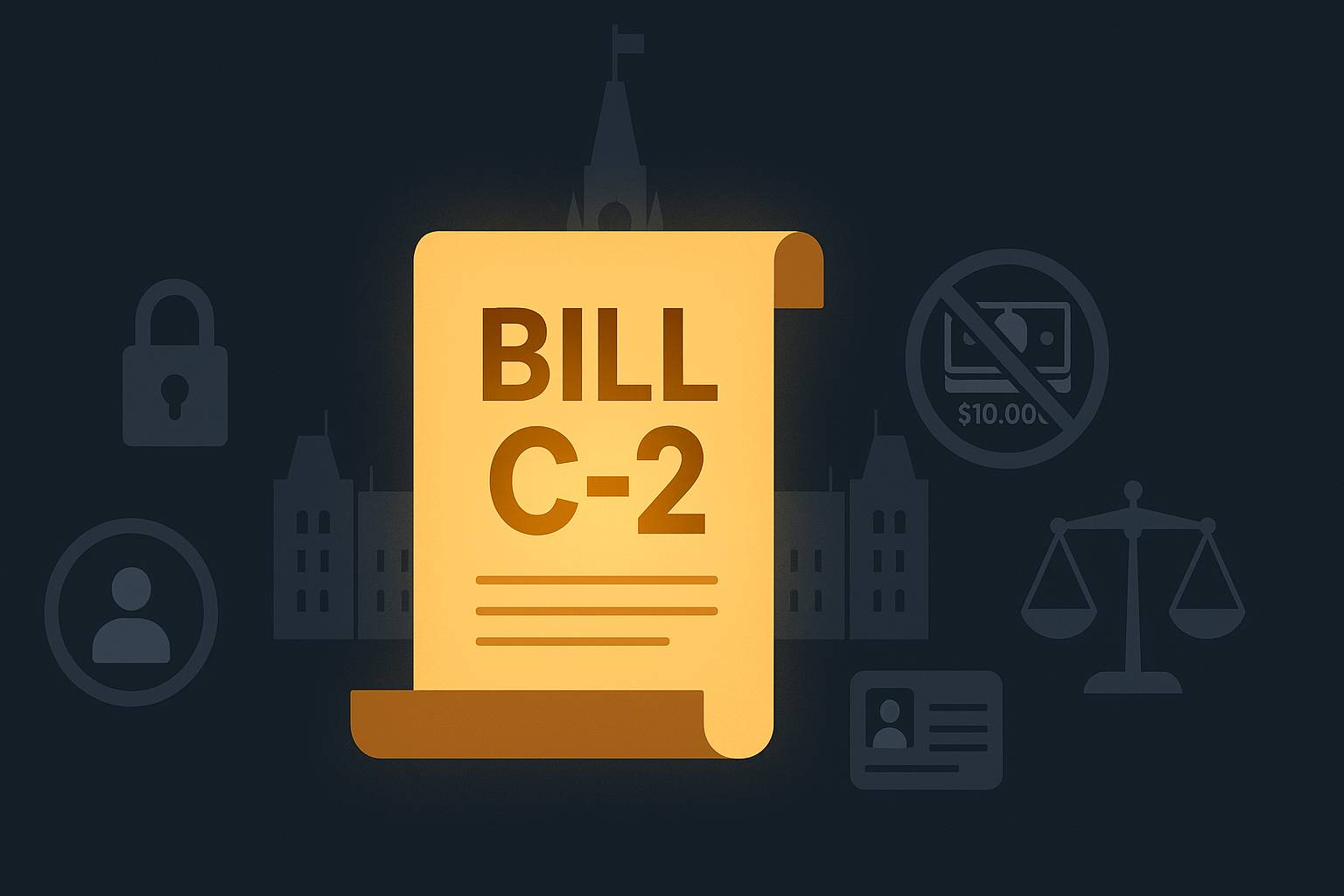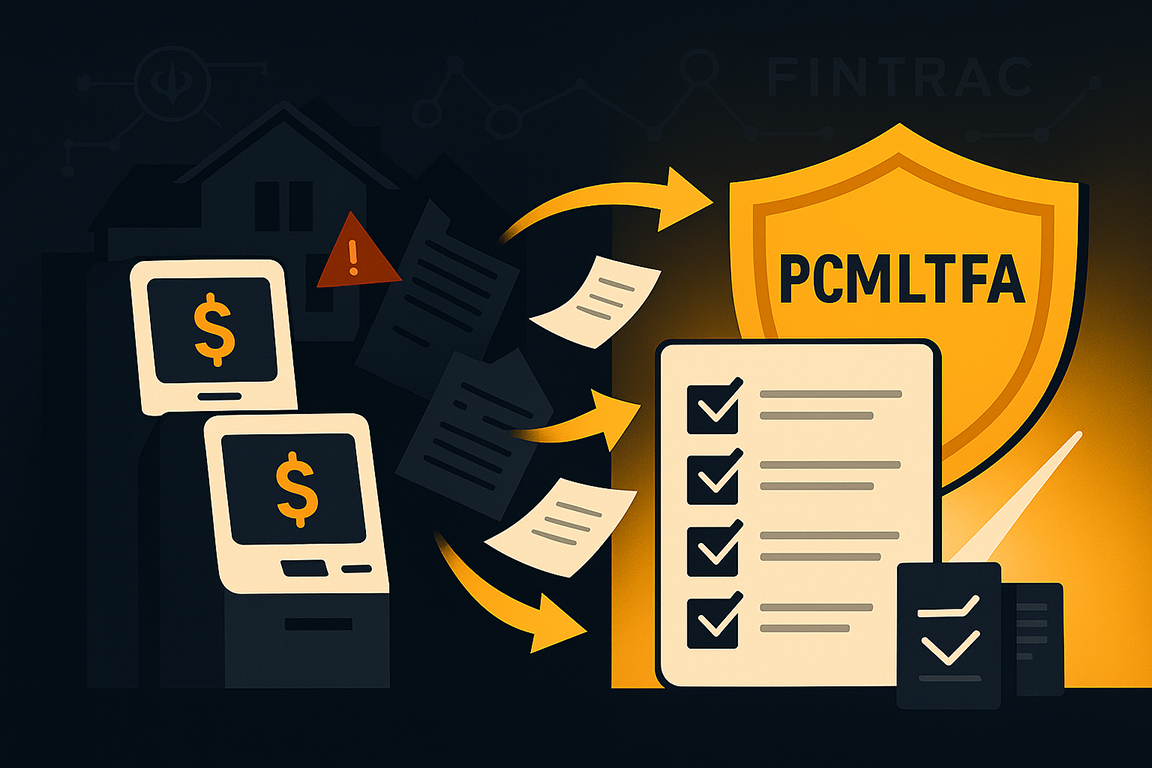16.09.25
Written by Haik Kazarian, Head of Business Development
Reviewed by Joseph Iuso, Board of advisors member at AML Incubator
Canada’s Strong Borders Act (Bill C-2): A New Era for AML/ATF Compliance in Canada
Canada’s proposed Strong Borders Act (Bill C-2) introduces higher FINTRAC penalties, universal enrolment, cash restrictions, and stricter AML/ATF program requirements. Learn what these changes mean for your business and how to prepare.

On June 3, 2025, Canada’s government introduced Bill C-2, the Strong Borders Act, for first reading in Parliament. This proposed law is one of the most significant overhauls of Canada’s anti-money laundering and anti-terrorist financing (AML/ATF) framework in decades. Many of the changes were foreshadowed in the 2024 Fall Economic Statement, which committed to closing loopholes and strengthening enforcement under the Proceeds of Crime (Money Laundering) and Terrorist Financing Act (PCMLTFA).
From PCMLTFA to Bill C-2
Bill C-2 builds on Canada’s existing AML/ATF obligations. The PCMLTFA already requires banks, insurers, securities dealers, MSBs, casinos, real estate brokers, accountants and others to maintain compliance programs, verify client identities, and report certain transactions.
What changes with Bill C-2 is the scale and scope of enforcement. The government is moving from a model focused on technical compliance to one centered on real-world effectiveness. It also ties into broader initiatives such as the public beneficial ownership registry and expanding sanctions enforcement.
Key AML/ATF Changes in the Strong Borders Act
-
Higher FINTRAC Penalties
Administrative penalties could increase up to 20 million dollars per violation or 3 percent of global revenues, whichever is higher. This brings Canada closer to the levels seen in the United States and the European Union. In addition to AMPs, criminal penalties for PCMLTFA offences will also increase, including higher fines and potential imprisonment. Entities should prepare by:
-
Reviewing governance structures – ensure boards and senior management understand personal and corporate liability.
-
Enhancing internal monitoring – track high-risk transactions and program effectiveness to detect issues before regulators do.
-
Documenting compliance decisions – keep records showing reasonable steps were taken, as this may mitigate penalties.
-
Conducting effectiveness testing – proactively audit AML/ATF controls to identify weaknesses that could lead to enforcement.
-
Budgeting for enforcement risk – penalties are now tied to global revenue, meaning group-level exposure.
-
Universal FINTRAC Enrolment
All reporting entities would be required to enrol with FINTRAC and keep their enrolment information up to date, with periodic renewal. Currently, this obligation applies only to money services businesses (MSBs and FMSBs). Other reporting entities such as banks, credit unions, securities dealers,and insurers do not enroll with FINTRAC, although they are supervised by FINTRAC for AML/ATF compliance and must file required reports. Bill C-2 would extend a formal enrolment regime to all reporting entities.
Note: Prudential and sector regulators (for example OSFI or provincial authorities) continue to oversee safety-and-soundness and sectoral requirements, but FINTRAC remains the primary AML/ATF supervisor.
-
Restrictions on Cash Transactions
Businesses and charities would not be allowed to accept single cash payments of 10,000 dollars or more. Financial institutions would also be barred from accepting third-party cash deposits. It’s worth noting, certain exemptions (e.g., prescribed transactions) may be defined in forthcoming regulations, so businesses should monitor these closely. Notably though, MSBs/FMSBs are not exempted from this restriction.
-
Prohibition on Anonymous Accounts
No account can be opened without verified client identity. This closes gaps in onboarding processes that rely on partial or delayed verification. While existing rules already required identity verification, Bill C-2 formalizes a prohibition on anonymous or fictitious accounts and third-party cash deposits.
-
Compliance Programs Must Be Effective
Compliance programs must now be reasonably designed, risk-based, and effective. This means that policies and procedures cannot simply exist on paper; they must be aligned with the entity’s risk profile, implemented in practice, and demonstrably capable of preventing and detecting money laundering and terrorist financing. In practice, this means:
-
documenting how risks are identified and why specific controls were chosen;
-
conducting and recording effectiveness testing at least every two years (per FINTRAC existing guidance);
-
ensuring training and monitoring activities align with identified risks; and
-
maintaining evidence that the program evolves with emerging threats and regulatory changes.
-
Compliance Orders & Agreements
Bill C-2 strengthens FINTRAC’s enforcement powers by making compliance agreements mandatory when required, and by obligating FINTRAC to issue compliance orders if entities do not comply. Breaches of these orders may themselves constitute violations.
-
Revocation / Denial of Enrolment
FINTRAC may refuse or revoke enrolment where entities have unpaid penalties, provide false information, or have associations with prescribed non-compliant entities
-
Added oversight on Information Sharing
FINTRAC’s role will be expanded by joining the Financial Institutions Supervisory Committee (FISC) and will see increased inter-agency information sharing, which may lead to faster and more coordinated regulatory actions.
-
Effective Date & Transitional Periods
The Strong Borders Act is still before Parliament. Its provisions will come into force on dates set by regulation, and businesses should expect phased implementation once passed into law.
Sector-Specific Impacts
Financial Institutions and Credit Unions
They will face greater scrutiny, especially around onboarding and cash handling. The global revenue penalty provision creates new risks for large players.
Money Services Businesses (MSBs)
Already registered with FINTRAC, but higher penalties and program effectiveness standards mean smaller MSBs will need to strengthen their systems and documentation.
Real Estate and Developers
Restrictions on high-value cash will change long-standing practices. Firms must reinforce verification procedures and rely more on electronic transfers.
Charities and Nonprofits
Large cash donations will no longer be possible. Donors will need to be guided toward non-cash methods.
FinTech and Payment Firms
Fast account opening flows must be redesigned to ensure no unverified accounts are created. Stronger ID solutions will be critical.
Practical Implications for Businesses
The universal enrolment requirements will introduce a new compliance step for thousands of entities that have never previously had to register with FINTRAC. While MSBs and FMSBs already register directly with FINTRAC, other reporting entities such as banks, credit unions, securities dealers, insurers and real estate firms will, for the first time, need to formally enroll. This means keeping information current, completing periodic renewals, and facing the possibility of enrolment being denied or revoked if obligations are not met. Compliance costs will rise as programs must not only exist but demonstrate real effectiveness. Operations will also need to adapt to cash restrictions and stricter onboarding standards. For multinationals, the tie between penalties and global revenue makes Canadian compliance a priority at the head office level.
Key Questions About Bill C-2
Q1. What is Bill C-2?
It is Canada’s proposed Strong Borders Act, introduced in June 2025. It strengthens AML/ATF laws with higher penalties, broader FINTRAC registration, cash restrictions, a ban on anonymous accounts, and a requirement for effective compliance programs.
Q2. How high can FINTRAC penalties go?
Up to 20 million dollars per violation or 3 percent of global revenues, far above the current 500,000 dollar maximum.
Q3. Which businesses need to register with FINTRAC?
All reporting entities under the PCMLTFA, including banks, credit unions, securities dealers, real estate firms, MSBs and charities.
Q4. How will cash restrictions work under Bill C-2?
Businesses and charities cannot accept payments or donations of 10,000 dollars or more in cash. Banks and credit unions cannot accept cash deposits from third parties.
Q5. What counts as an anonymous account?
Any account opened without verified identity or under fictitious details. Such accounts are prohibited.
Q6. What does “effective” mean for AML/ATF programs?
Programs must be risk-based, up to date and able to demonstrate that they reduce money laundering and terrorist financing risks.
Q7. How should businesses prepare?
Start with an AML/ATF Compliance effectiveness review, strengthen KYC processes, train staff on cash and onboarding rules, and prepare for FINTRAC registration.
Q8. Will these changes require more compliance staff?
Many organizations will need additional compliance resources or outsourced expertise to meet expectations.
Q9. How does Canada’s approach compare internationally?
The penalty structure now mirrors global peers. This signals to international partners that Canada is taking AML/ATF enforcement seriously.
Q10: Can FINTRAC revoke my enrolment?
Yes, under Bill C-2, FINTRAC may revoke enrolment if you fail to meet obligations or have certain prescribed associations.”
Q11: What happens if I fail to comply with a compliance agreement?
FINTRAC will issue a compliance order, and violation of that order may itself be a serious breach.
In A Nutshell
Bill C-2 shifts Canada’s AML/ATF framework toward prevention and accountability. Penalties will be higher, regulators will be stricter, and programs must prove their effectiveness. Organizations that prepare now will be better positioned to avoid penalties and maintain trust.
If your business needs support, contact AML Incubator. Our team helps organizations design, strengthen, and maintain AML/ATF programs that meet both regulatory and operational demands.
Read More
Services
-
MSB Registration – FINTRAC registration support from start to finish
-
CAMLO/MLRO Services – Outsourced AML/ATF leadership and reporting officer services
-
AML/ATF Compliance Effectiveness Review – Independent reviews to test program performance
-
Regulatory Remediation – Help with remediation after regulatory findings or penalties




